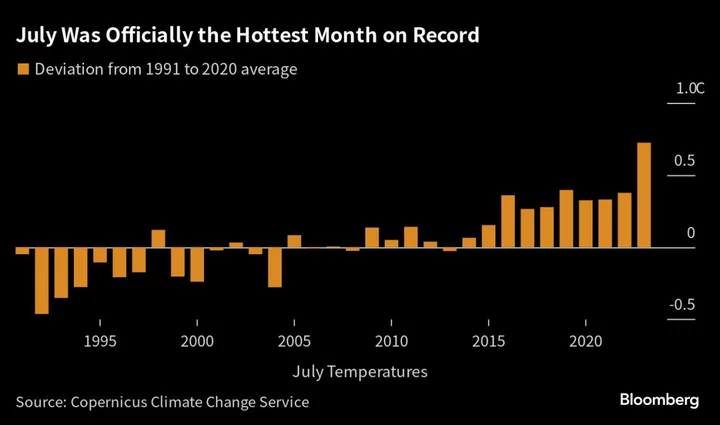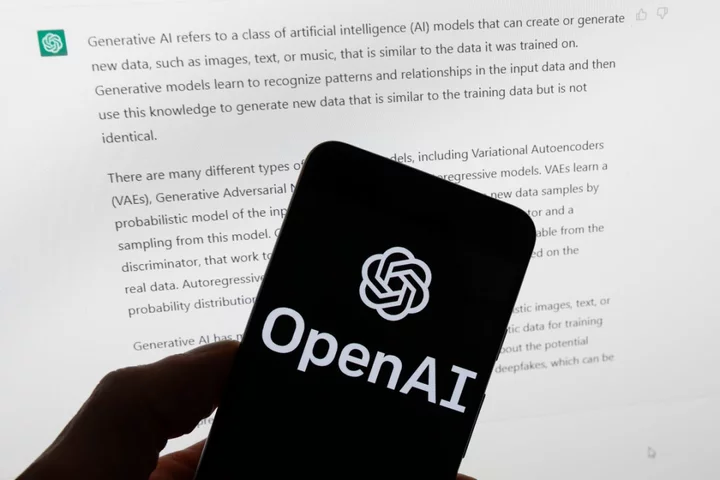
Take-Two forecasts second-quarter net bookings below estimates
(Reuters) -Take-Two Interactive Software forecast second-quarter net bookings below Wall Street targets on Tuesday, in a sign that spending on
2023-08-09 04:25

Apple planning host of powerful new computers with updated M3 chip, rumours say
Apple is planning a host of powerful new Macs, according to new rumours. The company is testing a high-end MacBook Pro, powered by a new M3 chip with more cores than in the existing M2 line, according to Bloomberg’s Mark Gurman. And it is also testing a new version of the Mac Mini, due for release next year, he reported. Apple has updated nearly all of its current Macs to the M2 line of chips – which also includes the M2 Pro, Max and Ultra – over recent months. That includes the Mac Pro, which had been long neglected and received an update at Apple’s Worldwide Developers Conference event in June, bringing Apple’s full line-up onto the same chip architecture. Now Apple is planning for the successor to those chips, the M3. They are expected to arrive with updated computers: the MacBooks and Mac Mini, as well as the iMac which has not gone updated since 2021. They could start arriving in computers from late this year, Mr Gurman reported. The high-end MacBook Pro updates are expected to arrive in 2024, he said. Apple said during its earning call last week that it was expecting to see Mac revenue decline in the fourth quarter of its financial year. That further suggests that Apple is not planning new Macs before the next financial year, which begins in October. Apple is widely expected to release new iPhones next month. The Pro models are due to receive a new chip in the form of the A17, which might offer some insight into the details of the M3, since Apple shares significant technologies between its iPhone and Mac chips. Read More Apple’s iPhone 15 release date leaked amid reports of ‘severe shortages’ Apple gives update on its plans for AI – and says it is coming to every product Apple results show sales slumping
2023-08-09 03:50

Zoom provokes outrage with changes to its terms of service on AI
Zoom has provoked outrage among its users after a change to its terms of service. This week, the company made a number of changes to its terms of service that related to the way it uses people's data and the content of their calls. They have led to widespread criticism from users, some of whom have quit over what they said was overly expansive permissions. In particular, critics focused on a passage in which users agreed to Zoom's "access, use, collection, creation, modification, distribution, processing, sharing, maintenance, and storage" of data "for any purpose". The new terms said that data could be used for a variety of functions, including "machine learning or artificial intelligence" such was training new artificial intelligence models. Many feared that the expansive rules would mean that Zoom could, for instance, use the data of meetings to train generative artificial intelligence systems. A number of companies have faced backlash over fears that they could be gathering user data with a view to training artificial intelligence systems using it, and customers have become increasingly concerned about the potential invasion of privacy and ownership that could present. But now Zoom has said that the terms were misunderstood, and updated them with a new line intended to make clear that chats would not be used to train AI systems. "Zoom will not use audio, video or chat customer content to train our artificial intelligence models without your consent," the terms now read. In a blog post addressing the controversy, Zoom said that it had introduced two new generative AI features, aimed at making it easier to summarise meetings and help with chats. At the moment they are offered on a free trial basis and administrators can choose whether they are turned on. "When you choose to enable Zoom IQ Meeting Summary or Zoom IQ Team Chat Compose, you will also be presented with a transparent consent process for training our AI models using your customer content," the company said in its update. "Your content is used solely to improve the performance and accuracy of these AI services. And even if you chose to share your data, it will not be used for training of any third-party models." Read More Now even Zoom tells staff: ‘Come back to the office’ OpenAI launches bot that will crawl the internet to educate GPT PayPal launches dollar-backed cryptocurrency
2023-08-09 03:23

Canada’s OMERS Pulls Its Venture Capital Arm From Europe
Omers Ventures, the venture capital arm of the Canadian pension plan, is pulling out of Europe, marking a
2023-08-09 02:54

PayPal Sees Stablecoin Generating Revenue From Payment Flows
PayPal Holdings Inc., which became the first global payments firm to launch a stablecoin on Monday, plans to
2023-08-09 02:18

July Was the Hottest Month on Record
July was officially the earth’s hottest month on record, causing the Antarctic to shrink at a record pace
2023-08-09 01:57

Neuralink, Elon Musk's brain implant startup, raises $280 million from Peter Thiel's VC fund
Elon Musk's biotechnology startup Neuralink raised $280 million in a fundraising round, the company announced on Monday via X, the Musk-owned social media platform formerly known as Twitter.
2023-08-09 01:55

Nvidia Unveils Faster Chip Aimed at Cementing AI Dominance
Nvidia Corp. announced an updated AI processor that gives a jolt to the chip’s capacity and speed, seeking
2023-08-09 00:24

OpenAI launches bot that will crawl the internet to educate GPT
OpenAI has built a new bot that will crawl over the internet, gathering information to educate artificial intelligence systems. Operators of websites will be forced to actively opt out, and block the bot, if they want to stop it taking data from their site. Artificial intelligence systems such as OpenAI's ChatGPT rely on vast amounts of data to train their models and learn how to give the correct outputs. So far, much of that data has been taken freely from the web. That has prompted numerous complaints from authors and other web users. Many have criticised OpenAI and others for taking personal information and copyrighted content to train their models, with that writing potentially informing or even being replicated in the system's answers. Artificial intelligence companies have also faced criticism from others who claim that such crawlers are stretching their web infrastructure. Elon Musk, for instance, has said that the load from such bots has forced Twitter to place limits on how many posts users could see on the site. OpenAI's existing ChatGPT 3.5 and 4 were trained on data taken from the internet that was taken up to late 2021. There is no way for owners of that data or the websites it was gathered from to remove it from OpenAI's models. Now OpenAI says that the new system, named 'GPTBot', will be crawling over data and writing on the web to gather more information to train future models. It told website administrators that they should include instructions to the bot to stop it from crawling a website, if they did not want that information to be gathered. Administrators are able to include such information in a file called "robots.txt", which gives instructions to other crawlers such as those used by Google for its search results. OpenAI says the bot "may potentially be used to improve future models". It also says that it is built to "remove sources" that require a paywall, gather personally identifiable information or have text that violates its rules. It suggested that letting the bot access sites "can help AI models become more accurate and improve their general capabilities and safety". Read More Meta’s Twitter rival Threads sees ‘steep drop in daily users by 80 per cent’ Google Assistant will be ‘supercharged’ with AI like ChatGPT and Bard PayPal launches dollar-backed cryptocurrency
2023-08-08 23:16

Canadian publishers seek antitrust probe of Meta blocking news
OTTAWA (Reuters) -Canadian news industry groups on Tuesday asked the country's antitrust regulator to investigate Meta Platforms' decision to block
2023-08-08 23:15

Palantir Slides as AI Hype Fails to Deliver Strong Sales Outlook
Palantir Technologies Inc., the software maker that has for years sold artificial intelligence-powered programs to governments, sank by
2023-08-08 22:26

Google fails to end $5 billion consumer privacy lawsuit
By Jonathan Stempel A U.S. judge rejected Google's bid to dismiss a lawsuit claiming it invaded the privacy
2023-08-08 22:24
